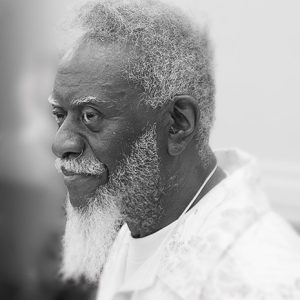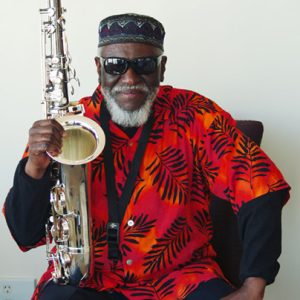calsfoundation@cals.org
Pharoah Sanders (1940–2022)
Pharoah Sanders was a noted jazz saxophonist recognized as a pioneer of the “free jazz” movement. Collaborations with artists such as Sun Ra and John Coltrane remain his most noted work, but his solo efforts stretched over five decades from 1964 into the first decades of the twenty-first century.
Pharoah Sanders was born Ferrell Sanders on October 13, 1940, in Little Rock (Pulaski County). His mother worked as a cook in a school cafeteria, and his father worked for the City of Little Rock. An only child, Sanders began his musical career accompanying church hymns on clarinet. His initial artistic accomplishments were in art, and it was not until he was at Scipio Jones High School in North Little Rock (Pulaski County) that Sanders discovered the tenor saxophone. The band director, Jimmy Cannon, was also a saxophone player and introduced Sanders to jazz. When Cannon left Scipio Jones High School, Sanders—still a student—took over as the band director until a permanent director could be found.
During the late 1950s, teenaged Sanders sneaked into African American clubs in downtown Little Rock to play with acts that were passing through. At the time, Little Rock was part of the touring route through Memphis, Tennessee, and Hot Springs (Garland County) for rhythm and blues (R&B) and jazz musicians, including Junior Parker. Sanders found himself limited by the state’s segregation and the R&B and jazz standards that dominated the Little Rock music scene.
After finishing high school in 1959, Sanders moved to Oakland, California, and lived with relatives. He briefly attended Oakland Junior College and studied art and music. Once outside the Jim Crow South, Sanders could play in both Black and white clubs. Sanders’s Arkansas connection stuck with him in the Bay Area with the nickname of “Little Rock.” It was also during this time that he met and befriended John Coltrane.
Sanders transplanted himself again in 1961, this time to New York City. Sanders often found himself financially destitute and on more than one occasion had to sell his saxophone for money. A year after moving to New York City, Sanders joined Sun Ra’s Arkestra and received another nickname, “Pharoah,” which proved to have more staying power than “Little Rock.”
Sanders formed his first band in 1963 while still collaborating and making appearances on records with Don Cherry and Sun Ra. Beginning in 1964, Sanders and Coltrane began to work together on a regular basis. Critics have often claimed that Sanders pushed Coltrane into a more radical and experimental direction, but it is a claim that Sanders denied. Sanders continued to play with Coltrane and his “free” group until Coltrane’s death in 1967.
The same year that Sanders began playing with Coltrane, Sanders’s first album, Pharoah’s First, was released on the Calibre label. Along with other experimental musicians, Sanders began to restructure and re-conceptualize the boundaries of jazz compositions. This movement was called “free jazz” and earned both acclaim and ridicule from critics. In 1966, Sanders released the first of a string of albums with Impulse! Records. Among these was his most critically acclaimed, Karma (1969), containing his most recognized recording, “The Creator Has a Master Plan.”
Sanders left Impulse! in 1973 and redirected his compositions back to earlier jazz conventions. He continued to explore the music of different cultures and refine his compositions. However, he found himself floating from label to label. He found a permanent home with a small label called Theresa in 1987, which was sold to Evidence in 1991. Frustration with record labels continued to plague Sanders for most of the 1990s. Also during this time, he went to Africa for a cultural exchange program for the U.S. State Department.
Sanders’s major-label debut would finally come in 1995 when Verve Records released Message from Home, followed by Save Our Children (1998). But again, Sanders’s disgust with the recording business prompted him to leave the label. In 2000, Sanders released Spirits and, in 2003, a live album titled The Creator Has a Master Plan.
Sanders lived in the Bay Area and continued to compose music, including ballets, and tour in Europe and the United States even later in life. In October 2015, he was named one of the recipients of a 2016 Jazz Masters Award from the National Endowment for the Arts. In March 2021, he released a new album, Promises, that was a collaboration with the London Symphony Orchestra.
Sanders died in Los Angeles, California, on September 24, 2022. On September 15, 2023, a remastered double vinyl reissue of his 1977 album Pharoah was released; the box-set included other previously unreleased live performances and a booklet.
For additional information:
Allan, Jennifer Lucy. “A Church with Open Doors: The Ecstatic Power of Pharoah Sanders.” Guardian, September 26, 2022. https://www.theguardian.com/music/2022/sep/26/a-church-with-open-doors-the-ecstatic-power-of-pharoah-sanders (accessed September 27, 2022).
Bayoumi, Moustafa. “Allah Supreme: How Pharoah Sanders Found Freedom and Rebellion in Islam.” Guardian, December 29, 2022. https://www.theguardian.com/us-news/2022/dec/29/pharoah-sanders-american-jazz-islam (accessed December 29, 2022).
Friedman, Nathaniel. “‘If You’re in the Song, Keep on Playing’: An Interview with Pharoah Sanders.” New Yorker, January 12, 2022. Online at https://www.newyorker.com/culture/the-new-yorker-interview/if-youre-in-the-song-keep-on-playing-pharoah-sanders-interview (accessed September 26, 2022).
Jung, Fred. “A Fireside Chat with Pharoah Sanders.” All About Jazz, March 21, 2003. Online at http://www.allaboutjazz.com/php/article.php?id=224 (accessed September 19, 2022).
Odell, Jennifer. “Legend of the Pharoah.” All About Jazz, December 8, 2004. Online at http://www.allaboutjazz.com/php/article.php?id=15624 (accessed September 19, 2022).
Stephenson, Will. “Land of the Pharoah.” Arkansas Times, August 7, 2014, pp. 14–16. Online at http://www.arktimes.com/arkansas/where-were-you-on-pharoah-sanders-day/Content?oid=3410064 (accessed September 19, 2022).
David Prater
Little Rock, Arkansas
 Arkansas Black Hall of Fame
Arkansas Black Hall of Fame Arkansas Entertainers Hall of Fame
Arkansas Entertainers Hall of Fame World War II through the Faubus Era, 1941 through 1967
World War II through the Faubus Era, 1941 through 1967 Pharoah Sanders
Pharoah Sanders  "Bluesin' for John C," Performed by Pharoah Sanders
"Bluesin' for John C," Performed by Pharoah Sanders  Pharoah Sanders
Pharoah Sanders 




Comments
No comments on this entry yet.